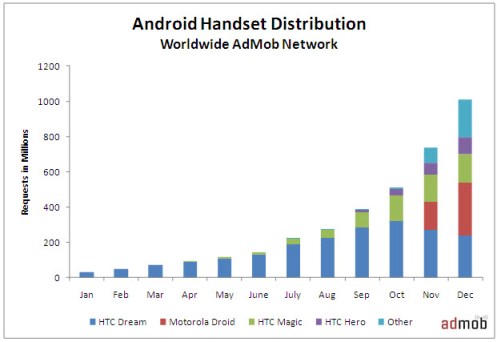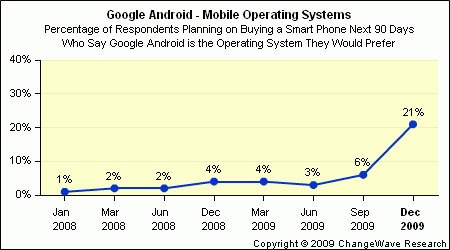 Google is poised to unveil its strongest iPhone rival yet later today — the Nexus One.
Google is poised to unveil its strongest iPhone rival yet later today — the Nexus One.
Originally hyped as the Google Phone, the Nexus One now has the tech blogosphere scratching its head over what appears to be a top-of-the-line, HTC-built phone. Dubbed an iPhone killer, and then a Droid killer, the Nexus One has some asking: What’s the big deal?
I’ve played with the Nexus One briefly. Sources who have owned both the iPhone and used the Nexus One for awhile say it’s better and faster than any previous Android phone. It’s light. It feels thinner then the 3GS and is incredibly fast. Like with other Android phones, Google’s strength in the cloud gives it advantages like a bar that lets you search the web and your phone’s apps at the same time along with killer Gmail integration, not to mention apps that run in the background. But alas, the same weaknesses persist: the iPhone has a much richer selection of apps with 100,000 choices and that gorgeous user interface.
As the latest in a never-ending march of Android devices, the Nexus One underscores the cultural differences between Google and Apple’s approaches to the mobile space.
AI Weekly
The must-read newsletter for AI and Big Data industry written by Khari Johnson, Kyle Wiggers, and Seth Colaner.
Included with VentureBeat Insider and VentureBeat VIP memberships.
Google, which was born from the web, has a mentality of incremental improvement typical of some of the younger startups we profile every day on this blog. In a single year, Android has gone through serious revisions from Cupcake to Donut to Eclair, providing deeper HTML5 support, the ability to upload and record video and a Bluetooth API. (Android updates are named in alphabetical order after pastries. Flan is next.) Android phones were fairly yawn-worthy until last fall, when the first truly competitive devices including the Motorola Droid emerged. Even the name Nexus One — emphasis on the numeral — suggests future iterations.
By contrast, Apple’s older roots in hardware (and Steve Jobs) reinforce a culture that requires perfection upon release. Apple’s full force is behind a single phone, while Google has its eggs in many baskets and is open. A benefit of Apple’s approach is the torrent of speculation that does more to market its products than any advertising. Apple also retains end-to-end control over the phone’s entire experience, simultaneously delighting users while aggravating developers.
Overall, incrementalism seems to be working for Google. A couple of stats released today bear out evidence of that success.
Google’s newly-acquired mobile advertising arm, AdMob, reports that requests for ads on Android devices nearly doubled between October and December. The company received 1 billion requests for ads in December. Motorola’s Droid is clearly leading the way with 30 percent of requests.

The Droid has also piqued consumer interest in Android-based phones. Twenty-one percent of people considering buying a smart phone in the next 90 days say they prefer Google’s Android as their operating system, according to a ChangeWave Survey.

That said, we think the oft-portrayed Android-iPhone fistfight is a bit simplistic. This isn’t a zero-sum game — yet. Smartphone penetration in the U.S. is still at 18 percent, according to The Nielsen Company. If Google can get a fraction of those users to convert to smartphones and cultivate an ecosystem of rich, web-based mobile applications, that’s a big win. And Apple can still have its cake and eat it.
We suspect there will be something beyond the Nexus One tomorrow. This would explain the normally paranoid company’s puzzling decision to hand the phone out as a Christmas gift to employees, taking the wind out of any device announcement.
Speculation has pointed to 1) a novel sales strategy giving consumers freedom to choose carriers, 2) Spotify availability (Spotify told us itself that it’s heading to CES, perhaps to make an announcement) or 3) a Google-HTC tablet.
In any case, we’re probably in for a surprise.
VentureBeat's mission is to be a digital town square for technical decision-makers to gain knowledge about transformative enterprise technology and transact. Learn More